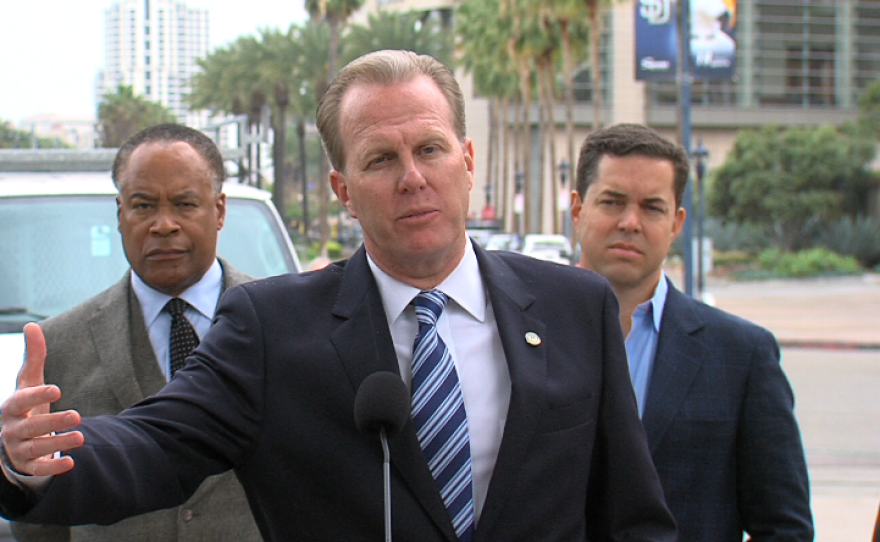Members of Mayor Kevin Faulconer's advisory group are holding the line against Chargers point man Mark Fabiani, who is lobbying for a new stadium downtown even though the task force determined the best spot for a new home for the team is in the area where it plays now.
The advisory group members also discount reports that financing a replacement for aging Qualcomm Stadium would require a massive development in Mission Valley. The group has said the financing plan will be diverse.
The advisory group was under the impression that Fabiani plans to tell NFL owners meeting in Phoenix this week that the Chargers have figured out what the nine-member panel will include in the financing plan.
However, the group isn't due to announce its financing plan until May 20.
"Anyone who suggests they know what's in our plan is lying," advisory group chairman Adam Day said Monday.
The advisory group moved up its timetable after the Chargers and their biggest rivals, the Oakland Raiders, announced plans to build a $1.7 billion stadium in the Los Angeles suburb of Carson if they don't get new stadiums in their current hometowns.
The AFC West foes were responding to the possibility of the St. Louis Rams moving to Los Angeles. Rams owner Stan Kroenke is part of a joint venture that wants to build an 80,000-seat stadium in the L.A. suburb of Inglewood.
Fabiani declined to comment when asked what he planned to say at the owners' meetings and why he continues to lobby for a downtown site.
Advisory group member Jim Steeg said the panel is looking forward to meeting next month with Eric Grubman, the NFL's point man on Los Angeles. "We'll tell him exactly where we stand and what we plan to get accomplished. It's not going to be tainted by other things, such as, 'This is what I think they're thinking,'" Steeg said.
The advisory group announced March 11 that building a new stadium near the old stadium would save at least $250 million and avoid delays since the city owns the 166-acre site.
Last week, Fabiani told KPBS that Mission Valley "is a complicated site" and "the community there is very much against a huge development, as they should be because the community is awfully crowded the way it is."
The advisory group is "not going to be distracted by people who are trying to pull us back downtown," Day said.
"Obviously a handful of people have spent a lot of time and invested a lot of money for plans for a stadium downtown," Day said. "I can understand if they're frustrated. But what might work for them financially doesn't work for the taxpayers. Mission Valley is the superior site. It's cheaper, quicker, easier. Anyone who believes that a stadium downtown can be done more cheaply and more quickly is delusional."
Day and Steeg pointed out that a decade ago, the Chargers wanted to develop the 166-acre Qualcomm site at maximum density to pay for a new stadium.
"Could there be development? Absolutely," Steeg said. "Massive? Not happening."
Day has reiterated that the advisory group will not recommend a financing plan that needs approval of two-thirds of the voters. Most people think such a measure would have no chance of passing.
A downtown stadium would have been financed in part by a hotel tax that would have required two-thirds approval.
Any franchise would need the support of three-quarters of the league's 32 owners to move to the nation's second-largest market, which hasn't had an NFL franchise since 1994.
Steeg is a former NFL executive who ran the Super Bowl for 26 years. He also worked for the Chargers from 2004-10.
Steeg said Fabiani could be trying to create the impression there isn't unity in trying to solve San Diego's long-running, contentious stadium issue.
Having worked for the NFL for so long, Steeg said he's confident the owners will make the right decision regarding the Chargers.
"That's the great advantage of requiring a three-quarters vote of ownership," Steeg said. "It's not five guys controlling it. It takes 24. Collectively, historically, they have made the right decisions."
Steeg said he thinks Faulconer's intention to solve the stadium problem has thrown Fabiani "off script."
"Potentially, they were marching down the road to Carson quietly last fall," Steeg said. "Now they can't quietly slip out of town. I'm not a believer that magically out of nowhere, from January to February, Carson developed in one month."







